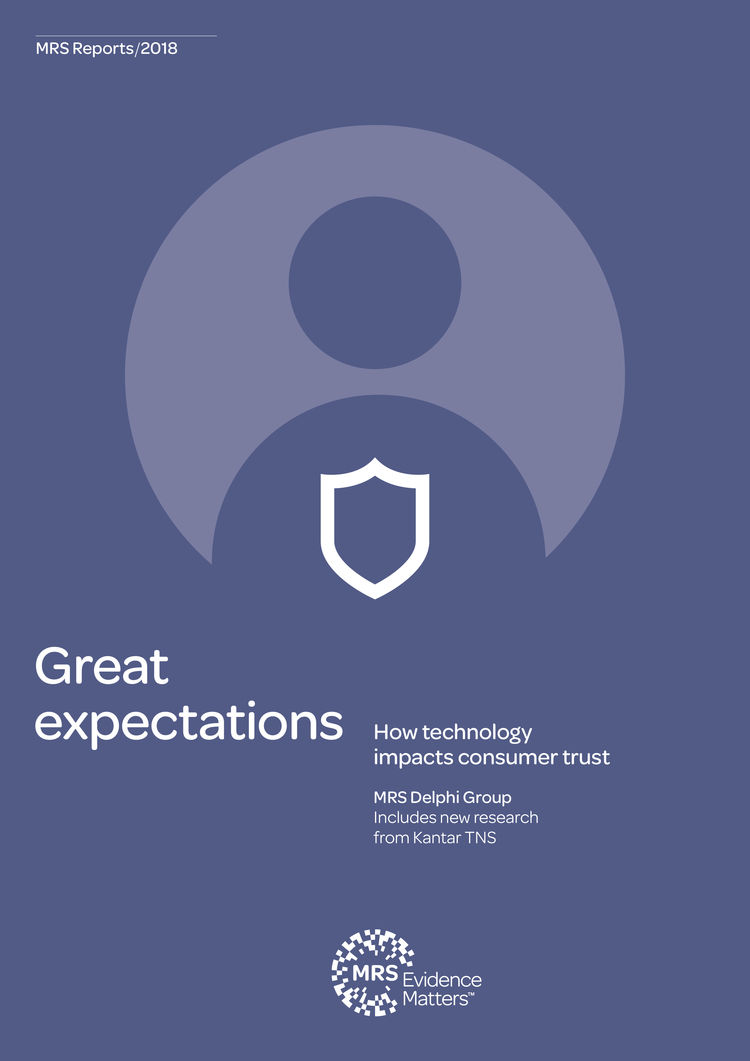New MRS report on technology and trust
Download the report 'Great expectations: how technology impacts consumer trust', published by MRS Delphi Group with new research from Kantar TNS.

We are all used to hearing about data leaks and the subsequent cover-ups. Many of us experience frustratingly obtuse customer service, and personalisation can be misguided or downright creepy. The story of tech is often negative, and that’s a real opportunity for some organisations. The ones that get it right will build a brand that doesn’t disappoint and exasperate; a brand that really puts customers first, which they can trust.
The new report from MRS Delphi Group entitled 'Great Expectations: How technology impacts consumer trust' sets out to explore some of the positive aspects of how technology can have an impact on consumer trust. Three years ago, the MRS Delphi Group published a privacy report ‘Private Lives’ and since then we’ve seen many epic fails from brands that didn’t read the writing on the wall.
Of course, any definition of trust is fluid and there are many aspects to trust that are not touched on here. But for the purpose of this report, we have focused on trust as experienced through technology, and our survey included 18 consumer ‘trust expectations’ spanning the themes of transparency, control, relevance, security and fulfillment.
As we will see, some trends may be taking longer to play out than originally expected and many of us are still in quite a traditional frame of mind when it comes to our personal data.
For example, marketers and planners may delight in the potential that data provides to microtarget customers, but are customers as delighted?
Our research reveals that many consumers first want to be convinced that a brand can meet basic needs in terms of safety and security, before they embrace a deeper relationship founded on more sophisticated proposals like data value exchange.

Download the report 'Great expectations: how technology impacts consumer trust', published by MRS Delphi Group with new research from Kantar TNS.


Working within the framework of Maslow’s hierarchy of needs, all organisations need to identify the‘deficiency needs’of their customers. These are the minimum customer trust expectations, the table stakes, that every organisation is now expected to deliver. This foundational level of trust is required before an individual will progress to allowing a brand to fulfil their ‘growth needs’.
A clear warning from this report is for those brands who think they can leapfrog the first step and provide their customers with sophisticated services and technology before establishing their credentials in meeting these foundational needs.
Amazon gets top marks, in part because the public does not associate it with data breaches and so meets the foundational trust expectations. Also, we don’t feel the rub when personalisation kicks in. The data value exchange is frictionless, not an irritant, and the pay off is a good efficient dependable service. Technology is certainly in this instance a large contributor to brand loyalty.
How much of this is merely a function of transparency, and how much is the wider emotion of trust? Back to definitions. When customers trust they remain loyal to a brand in the face of uncertainty and risk.
When push comes to shove will Amazon go beyond the Ts&Cs to help you? Could you the customer take a risk, leap into the known, and rely on your favourite brand to catch you?
In some ways we already take huge risks, and we do so increasingly. Each new service stretches our definition of trust a little bit further. Today it’s common to get into a stranger’s car. Tomorrow that car may be driverless.
The MRS Delhi Group’s hypothesis is that these consumer trust expectations are evolving, in some instances faster than organisations can keep up with, and in some surprising directions. Our research suggests that millenials have a heightened understanding of what can go wrong and brands should not underestimate their capacity to punish those that fail to protect their data.
With GDPR providing a corrective to some of these trust issues, it is important that we understand where our customers sit within the framework of these trust expectations and how their expectations change depending on, for example, sector.
This report raises critical questions for brands – not least whether you are measuring against these expectations as part of your reputation index?
Another clear message in this report is that meeting trust expectations needs to be a cross departmental effort, driven from the top down. Investment in tech is strategic and long term. If you measure against these trust expectations your business case for investment in technology to improve customer services and experience will be much stronger.
We live in an era of marginal competitive advantage. Getting data security right is now the cost of doing business. In this environment shiny and new doesn’t count for anything if you haven’t established whether you are keeping up with these evolving trust expectations.
Technology is critical to transparency, and transparency is critical to trust. The difficulty we have in establishing where one starts and the other ends reflects the shifting sands of customer needs, and the need to measure, monitor and analyse them constantly to ensure future growth.
Our newsletters cover the latest MRS events, policy updates and research news.
0 comments